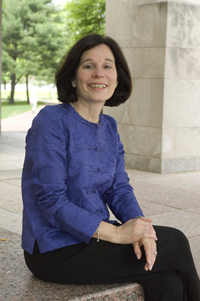Sargent Rehab Counseling Programs to End
Low enrollment leads to planned phaseout by 2008

After several years of low enrollment in Sargent College’s bachelor’s program in rehabilitation and human services and its master’s and clinical doctoral program in rehabilitation counseling, the University’s Board of Trustees voted to discontinue the programs at a board meeting on Tuesday, July 10. Current students will be able to complete their course work, but no new applications will be accepted, and the programs will formally end in May 2008.
“While the programs were valuable for many years, the college needs to put more resources into the programs and centers that draw more students,” explains Gloria Waters, dean of Sargent College.
“The students and alumni value the education that they received here very much,” she says. “But we now graduate so few students that as we move forward, we want to be able to make the largest impact on rehabilitation sciences that we can with the resources we have.”
Programs in rehabilitation counseling were first offered at SAR in 1973. Students and faculty in the program work closely with the BU Center for Psychiatric Rehabilitation, which focuses on providing life- and work-skills training for people with mental illness and psychiatric disabilities. Graduates often go on to work in the areas of psychiatric rehabilitation, industrial rehabilitation, disability management, or vocational evaluation. The programs became a part of the occupational therapy department in 2005 because of their small size.
There are more than 750 active alumni of the programs, but last semester only 23 undergraduates, 9 master’s students, and 3 doctoral students were enrolled. While the Sargent master’s program is one of the country’s top rehabilitation counseling programs, ranked fifth in 2006 according to U.S. News and World Report, Waters says that one reason for declining enrollment is that other highly ranked programs are offered by public universities with lower tuition, and the earning potential for rehabilitation counselors is fairly low.
She also points out that while undergraduate enrollment in the health and human services program has declined significantly over the past decade, it has grown tremendously in other Sargent programs — particularly in the health sciences department, which jumped from 180 students in 2004 to 400 students last year. “We need to reallocate resources to programs that are in greater demand,” she says.
Some alumni have expressed disappointment that the program is being discontinued, but Waters notes that both Sargent and the University will continue to train students to work in the mental health rehabilitation field. The Center for Psychiatric Rehabilitation, the primary research arm of the rehabilitation counseling department and a World Health Organization Center of Excellence, will be integrated into the SAR occupational therapy program. In addition, the field education and training programs at the School of Social Work and the Graduate Medical Sciences Program at the School of Medicine, which has been offering a master’s degree in mental health and behavioral medicine since 2002, educate students in the area of mental health.
Waters believes that the change will strengthen Sargent’s other degree programs and further the college’s potential to advance the rehabilitation field. “Although individual graduates have a huge impact on people’s lives, we felt that the impact of our program was limited due to the very small number of students who graduate from the program,” she says. “We will continue to have a major impact on the field of mental health through our occupational therapy program and the Center for Psychiatric Rehabilitation.”
Jessica Ullian can be reached at jullian@bu.edu.